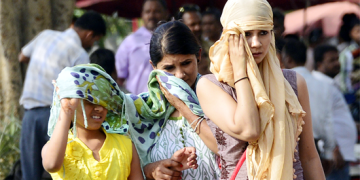CGTN
India is a nation that has long been accustomed to a monsoonal climate season. Under its normal annual weather conditions, much of the country experiences extreme heat waves in the late April and early May timeframe and then the cyclones routinely swirl in to start up the wet season. From June through September most parts of India will capture 70 percent of their annual rainfall on average.
From 2016 to 2021, this was the norm as India had witnessed higher than average rainfall totals, along with cooler temperatures. Accordingly, many Indian farmers had enjoyed bumper harvests for five years successively and the good times had rolled in as the country could ensure food security nationwide and for the South Asia region.
Yet this year was very different, since the country had experienced its hottest March on record, according to records kept for the past 122 years – the average temperature at 33 degrees Celsius. In April, the country had its hottest in 50 years, while May endured record-breaking temperatures. New Delhi topped out at 49 degrees Celsius. Some rains came in early June but at well below average.
Mumbai, India’s financial center, has recorded just 230.4 mm. of rain, which is only 46 percent of its average June rainfall total at 494.1 mm.
The heat wave lasting from March through early June along with the dry spell has hit the northwestern and northern parts of India the hardest. The farmers in Uttar Pradesh state are getting crushed, especially those cultivating mangoes, which have been dubbed as India’s “king of fruit,” but their yields have plunged to 70 percent or even worse for this year.
India remains a
largely rural nation
Despite India’s rapid development, as well as industrialization, urbanization and modernization drives under Prime Minister Narendra Modi, the nation remains largely rural. More than 800 million Indians are believed to reside in villages with deep connections to the agricultural sector. The nation’s agriculture industry accounts for an estimated 15 percent of the nation’s GDP. Meanwhile, most Indians prefer to eat only locally-grown food.
But this year’s heat wave will continue to impact the country and the world at large for perhaps another few years longer. Indians may have a passion for mangoes, but the prices of this fruit have doubled, tripled and even quadrupled. Hence, there’s much lower demand for the “king of fruits,” while other summer crops are yielding dismal results as well.
At the beginning of the annual monsoon season in early June, farmers across the country start planting summer crops, such as rice, sugar canes, pulses, oil seeds, among others. The summer harvests account for about half of all of the nation’s food production levels. But the prolonged heat waves and dry weather could spell doom for them as inflation keeps soaring.
India’s April inflation index hit 7.8 percent and it’s likely that has jumped higher in May since the Russia-Ukraine conflict has also sparked higher prices for food and energy supplies worldwide. Although, New Delhi will not comply with the U.S.-led economic sanctions on Russia, the country cannot escape unscathed.
Additionally, Indian wheat farmers have taken a drubbing from the record-setting high temperatures.
Wheat exports’ ban
to affect global markets
In recent years, Indian wheat farmers had reaped bountiful harvests but 2022 will turn into a nightmare. New Delhi announced the wheat exports ban on May 13, in order to “manage the overall food security of the country and to support other vulnerable developing countries,” according to a media report. India stands tall as the world’s second-largest wheat producer, but for the moment – the country does not hold sufficient stocks for its own citizens along with meeting global demand.
Wheat prices have risen from an estimated $325 tons in April to over $450 tons by mid-June. Ukraine and Russia are other major wheat exporters but Russian President Vladimir Putin’s “special military operations” in Ukraine have exacerbated the dwindling supplies of wheat worldwide.
Indian wheat farmers had a golden opportunity to capitalize on the higher prices but the heat wave scorched their global ambitions. India’s nationwide wheat stocks have dropped to alarmingly low levels, according to government figures with the opening balance for wheat stocks decreasing to 19 million tons in April. Nonetheless, in May, the stock had increased to 30.3 million tons. But, that’s far below the corresponding figures of 52.6 million in May 2021.
So, India’s Minister of State for External Affairs Vellamvelly Muraleedharan strongly supports the policy, although it will inevitably result in much higher food prices for consumers all over the world. But the wheat exports ban can stabilize food prices for Indian consumers as its intended purpose.
The heat waves are here to stay
This year’s record-breaking heat wave in India could be a harbinger of tougher times to come. We can see that climate change is for real and will lead to more extreme temperatures and weather events. Many Indians are not well equipped to handle the conditions.
It’s believed that less than 10 percent of all Indians have access to air conditioning in their homes. The country is also confronting chronic power outages so with increasing energy consumption on hot days that will impact the normal operations of the nation’s factories, offices, schools and shops.
In other words, we cannot ignore the climate change impact on India and elsewhere. India’s heat wave has harmed its agriculture sector and when food shortages are looming across the globe that will affect consumers overall.





